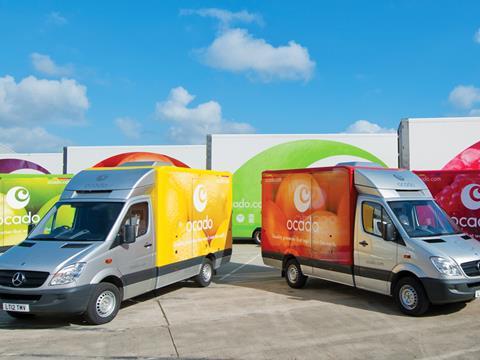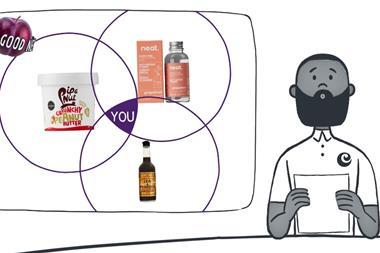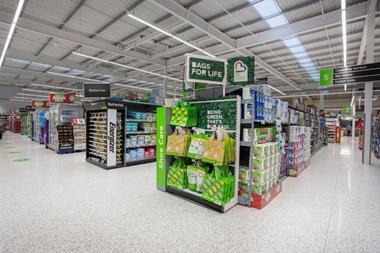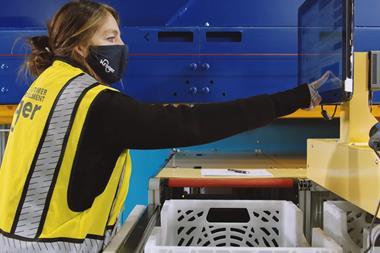
Top story
Ocado retail sales fell back 4% in its fourth quarter as labour shortages, temporary capacity contrants and the normalisation of consumer shopping behaviour dented the online supermarket’s growth.
Customer orders per week were up 9% versus the prior year, driven by a 22% increase in active customers to 832,000/
However, the value of the average basket fell 12%, to £118 as customer behaviours continued to normalised as people returned to the office and spent less time at home.
Ocado said order growth, while positive, was impacted by the “changing conditions in the post-lockdown UK labour” market in addition to the previously guided temporary reduction in capacity at the Erith Customer Fulfilment Centre.
It said sales growth was held back by labour shortages as headcount decreased across its delivery and CFC roles. However, since the end of the UK furlough scheme and Ocado’s own actions in the quarter vacancies “are returning to more normal levels”.
Headline sales were down 4% in the 2021 quarter to £547.8m, albeit still up 32% compared with 2019.
Participation of M&S products in the mix continues to be strong, at nearly 30% of the basket.
Ocado also said it is experiencing cost inflation due to nationwide utility price increases and dry ice shortages and these being mitigated through various cost management measures.
Looking forward, Ocado expects to return to strong mid-teens revenue growth in 2022, at the top end of its historica pre-Covid range of 10%-15%
The three new CFC sites opened in 2021, combined with the Bicester site to go live in 2H22, represent around 50% more available growth capacity compared with 4Q20
Following the success of Zoom in West London, Ocado Retail expects to open a second Zoom site, in Canning Town, in the second quarter of 2022; three further sites are planned for the second half of next year - these Ocado Retail Zoom sites will generate average revenues of around £20m per year.
Bicester CFC is planned to open in the second half of 2022 and Luton CFC will open in 2023, adding 30k and 65k orders per week respectively to bring total potential capacity to around 700k OPW (on a pre-Covid basket).
It plans for EBITDA margin to rebuild towards 2021 levels following a significant year of investment in 2022, with long-term margins underpinned by technology and operating leverage
Melanie Smith, Ocado Retail’s CEO: “Over the past year our brilliant colleagues across Ocado Retail have been working to further strengthen our range and deliver more value for money to customers, as we continually refine and improve on the best customer proposition in the market. We are delighted that M&S products now account for nearly 30% of the basket - our customers clearly love the opportunity to buy M&S food online.
“The investments we have made over the past year mean we have significant capacity for growth in 2022 and we will continue to invest in facilities, systems and people in the year ahead to deliver on our long-term growth potential. We are working hard to manage current industry challenges, and Ocado Retail has great momentum as we get ready for another record Christmas and further strong progress next year.”
Ocado chairman Tim Steiner added: “We are very encouraged by the underlying trends which are driving growth in our business. Hundreds of thousands of UK consumers have tried online grocery over the last eighteen months and the vast majority are continuing to shop online and are not going back to physical stores.
“These customers increasingly appreciate the customer service provided by Ocado.com and Ocado Zoom and the range of customer missions that we satisfy from the big basket to the top-up shop. We can see this in the strong growth in customer transactions at Ocado Retail over the second half of the year. At a time of growing momentum in the channel shift from physical stores to online we are bringing significantly more capacity to market and are confident that we are on a strong, long-term growth trajectory”.
Morning update
Poundland owner Pepco Group has posted a strong rise in full year profits as new store openings drove double-digit revenue growth.
Total group revenues for the year to 30 September were up 17.2% to €4.1bn, representing constant currency growth of 19.3% constant currency.
This group achieved this growth despite a challenging trading environment affected by Covid, in which approximately 9% of trading weeks were lost due to store closures.
The group saw significant new store expansion continues across all trading brands, with 483 net new stores opened in the year (424 excluding Fultons stores acquired and trading at the year-end).
Pepco’s like for like growth was 9.8%, including the impacts of Covid-related store closures, driven by the strength of proposition, including store and proposition refit programmes and higher levels of customer demand.
Poundland Group’s full year like for like growth was 3.1% and “provides a clear indication of the strengthened customer offer”. In particular, it saw strong performances across recently extended categories in clothing and homewares and the introduction of a new frozen and chilled offer to 127 stores in the year.
Alongside the renewal programme the proposition transformation continues to drive multi-price participation to 36.2% of sales (compared to 25.9% last year).
Group gross profit margin of 42.9% represents a 220bps improvement YOY, driven by a combination of ongoing sourcing benefits, a short-term Covid benefit from an enhanced general merchandise mix and lower levels of mark down.
Underlying EBITDA rose to €647m from €442m, benefitting from continued store expansion, gross profit margin upside through better sourcing and mix improvement, alongside tightly managed operating costs.
Underlying profit before tax jumped to €244m from €49m.
Pepcp said the outlook for the business “remains favourable, given its market-leading positioning, pricing and proposition in the attractive and growing discount variety retail sector in Europe and the UK”.
It said it has a strong new store pipeline for 2022 and beyond, with a substantial number of store renewals which deliver enhanced customer experience and drive sales.
“Whilst the Group continues to face commodity inflation and increased shipping costs alongside supply chain disruption at the start of our new financial year, the Group has a clear strategy to mitigate these impacts,” it stated,
Andy Bond, CEO Pepco Group, said: “Despite a challenging backdrop, we made impressive progress against our strategic objectives to further cement our status as one of Europe’s strongest and most attractive growth stories in physical retail.
“In this current financial year, we intend to invest to maintain or grow our price advantage and support customers at a time when household budgets remain stretched. To mitigate wider inflationary pressures across our markets, we will also continue to execute on our plans to reduce operating costs.
“While market conditions may remain challenging for some time to come, the Group is very well positioned to continue its strong track record of growth and we remain confident in the significant growth opportunities we have ahead of us.”
Elsewhere, British shoppers are set to spend £6.8bn at UK supermarkets in the next two weeks leading up to Christmas Eve, up from £6.7bn in 2020, according to new data released today by NielsenIQ.
Nielsen found total till grocery sales fell 2.5% in the last four weeks ending 4th December. However, grocery spend has already begun to pick up, with sales at -0.9% in the first week of December, indicating that spend is set to increase in the next two weeks ahead of Christmas.
Online grocery sales have fallen by 13% in the last four weeks ending 4th December 2021. However, this is against lockdown comparatives in the same period in 2020. The online share of FMCG sales at UK supermarkets remains at 12.4% - similar to last month - with in-store sales up by +0.2% indicating that shoppers are continuing to adopt omnichannel shopping behaviours.
In terms of retailer performance in the last 12 weeks, the fastest growing food retailer is M&S (+9.1%), which has outpaced Lidl (+8.3%) and Aldi (+4.6%) and these are the only retailers to grow sales against this time last year.
Tesco was the best performing of the mults, with sales down 0.7%, compared to a 4.2% decline at Asda, 4.6% at Sainsbury’s and 5.6% at Morrisons.
Mike Watkins, NielsenIQ’s UK Head of Retailer and Business Insight, said: “Whilst our data may show that performance at the big four supermarkets is weaker, we must remember that this is against strong comparatives last year when the nation was in lockdown. For example, retailers with a larger convenience footprint may see higher fluctuations in sales.
“This year more than ever, we can expect shoppers to plan activities and meal occasions around family and friends. The sales figures in November are partly due to lockdown comparatives but also shoppers delaying big shopping trips until the final week before Christmas when fresh foods and any remaining indulgences are purchased.
“For 1 in 3 households there is going to be good availability as well as low prices, which are typically the most important factors in deciding where to shop3 and we anticipate that the 23rd December is likely to be the peak day for trading at UK supermarkets.”
On the markets this morning, the FTSE 100 is back up 0.5% to 7,269pts.
Early risers include McBride, up 5.3% to 63.2p, Ocado, up 4.3% to 1,659.5p and Greencore, up 2% to 130.6p.
Fallers include Naked Wines, down 2.8% to 661p, Glanbia, down 2.2% to €12.22 and McColl’s, down 1% to 11.9p.
Yesterday in the City
The FTSE 100 started the week falling back 0.8% to close Monday at 7,231.4pts.
Fallers yesterday included THG, down 7.8% to 180.2p, Hotel Chocolat, down 5.6% to 502p, C&C Group, down 5.3% to 218p, SSP Group, down 4.9% to 222.9p, Greencore, down 4.2% to 128.1p, Deliveroo, down 4.1% to 222.4p, WH Smith, down 3.4% to 1,335p and Just Eat Takeaway.com, down 3.4% to 1,335p.
The day’s few risers included Glanbia, up 2% to €12.50, Coca-Cola Europacific Partners, up 0.8% to €47.55, Ocado, up 0.4% to 1,691p and Tesco, up 0.3% to 285.4p.



















No comments yet